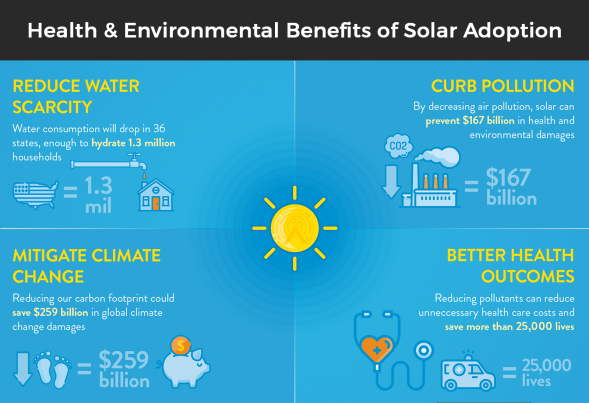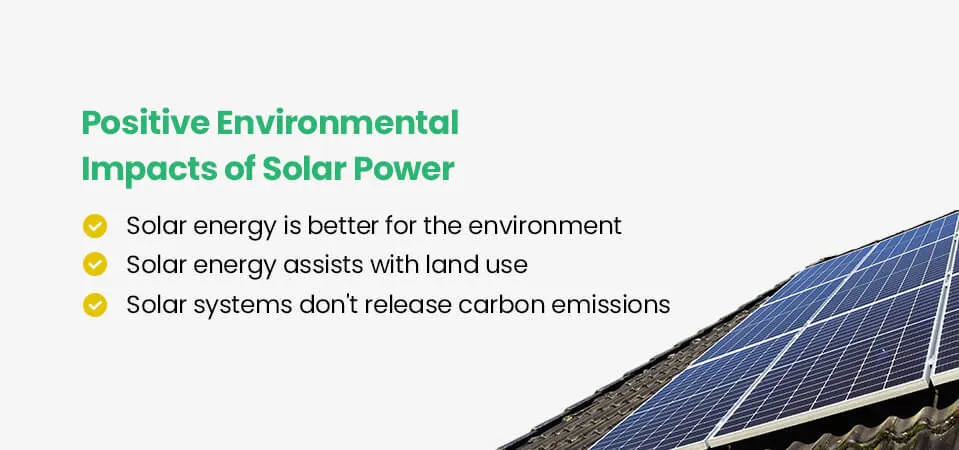In an era marked by climate change and environmental concerns, it has become imperative for individuals, businesses, and governments to make sustainable choices. One such choice with a profound impact is the adoption of solar energy. In this blog, we will explore the environmental benefits of converting to solar energy and how it can contribute to a healthier, more sustainable planet.
1. Reduction in Greenhouse Gas Emissions:
One of the most significant advantages of solar energy is its ability to reduce greenhouse gas emissions. Unlike fossil fuels, solar power generation produces no direct emissions of harmful pollutants or carbon dioxide (CO2). By harnessing the energy of the sun, we can significantly decrease our carbon footprint and combat global warming.
2.Clean and Renewable Energy Source:
Solar energy is a clean and infinitely renewable energy source. The sun’s energy is virtually inexhaustible and does not deplete natural resources or harm ecosystems. By utilizing this abundant resource, we can reduce our dependence on finite fossil fuels, which are not only finite but also come with environmental and geopolitical challenges.
3. Air and Water Pollution Reduction:
Traditional energy sources like coal and natural gas are known to release pollutants into the air and water. These pollutants can have detrimental effects on human health and the environment. Solar energy generation has no such negative impacts, helping to improve air quality and protect water sources.

4. Preservation of Natural Habitats:
Extracting fossil fuels often involves damaging natural habitats and ecosystems. Oil drilling, coal mining, and gas extraction can disrupt ecosystems, destroy biodiversity, and harm wildlife. Solar energy, on the other hand, has a minimal impact on the environment, helping to preserve fragile ecosystems.
5. Energy Independence and Security:
By transitioning to solar energy, individuals and nations can reduce their reliance on imported fossil fuels, enhancing energy security. This reduces the need for energy-related conflicts and the environmental impact of transporting and storing fossil fuels.
To promote domestic manufacturing of solar equipment, the government launched the “Make in India” initiative. This has led to increased production of solar panels, inverters, and other components within the country, reducing dependence on imports and boosting the domestic solar industry.
6. Reduced Water Usage:
Traditional power plants, especially those powered by fossil fuels, require vast amounts of water for cooling and other processes. Solar power plants have significantly lower water requirements, helping to conserve this precious resource, especially in regions prone to water scarcity.

7. Mitigation of Urban Heat Islands:
Solar panels installed on buildings and in urban areas can help mitigate the urban heat island effect. They absorb sunlight and convert it into electricity, reducing the amount of heat absorbed by buildings and pavements, thereby lowering overall temperatures in urban environments.
8. Long-Term Sustainability:
Solar panels have a long lifespan, typically lasting 25 years or more. This longevity reduces the need for frequent replacements and minimizes waste. Furthermore, solar panels are recyclable, ensuring that their materials can be repurposed at the end of their life cycle.
9. Reduced Noise Pollution:
Solar energy systems operate quietly, unlike some traditional power plants and generators that produce noise pollution. This quiet operation is beneficial for both urban and rural environments, promoting a healthier living environment.

10. Environmental Stewardship:
Choosing solar energy reflects a commitment to environmental stewardship. It is a tangible way for individuals and organizations to demonstrate their dedication to preserving the Earth’s natural beauty and resources for future generations.
In conclusion, the environmental benefits of converting to solar energy are substantial and far-reaching. By embracing solar power, we can make a positive impact on our planet, reduce our carbon footprint, protect natural ecosystems, and work towards a more sustainable and environmentally responsible future. So, let’s show our love for the Earth by harnessing the power of the sun and taking a significant step towards a cleaner, greener, and healthier world for all.
Author:
Byjuraj RS
Solar Energy Consultant & CEO
SEnSOL Technologies
 +91 9447222900
+91 9447222900 sensolindia@gmail.com
sensolindia@gmail.com
